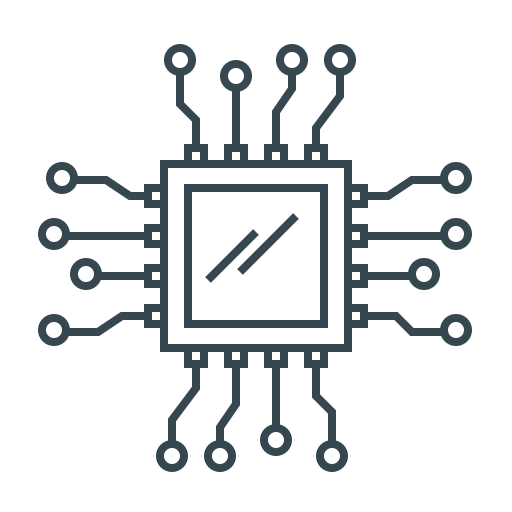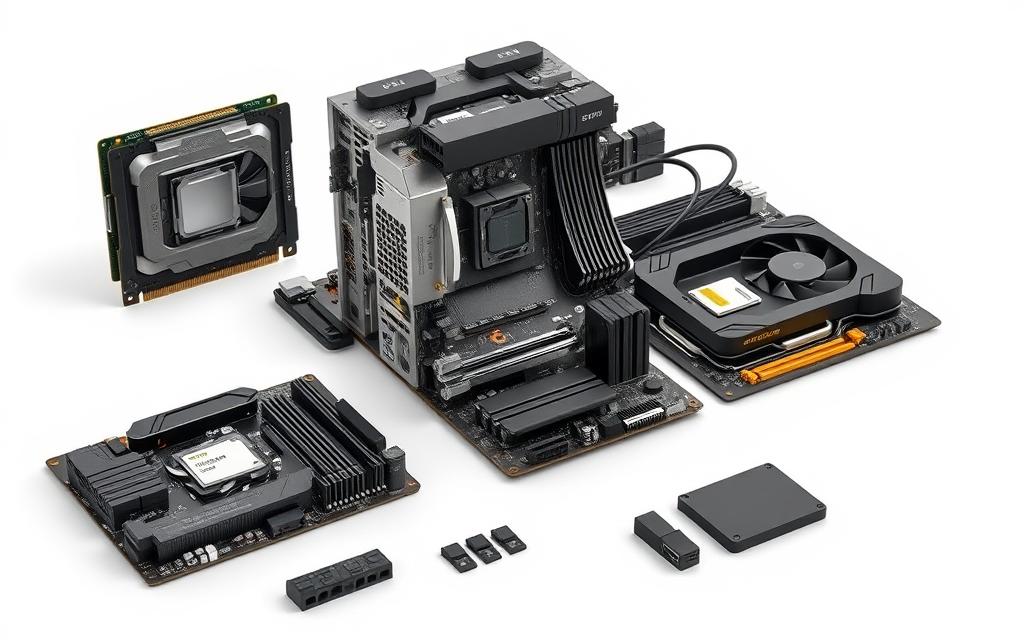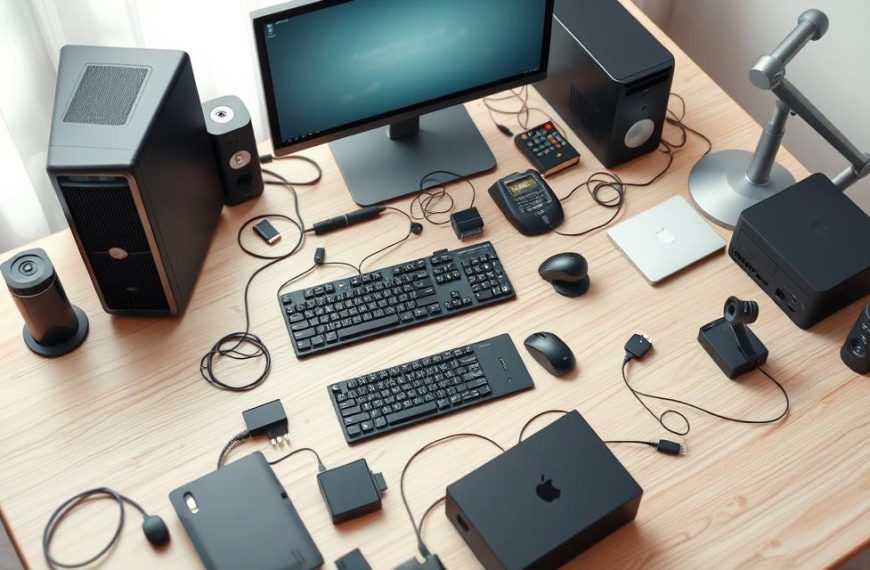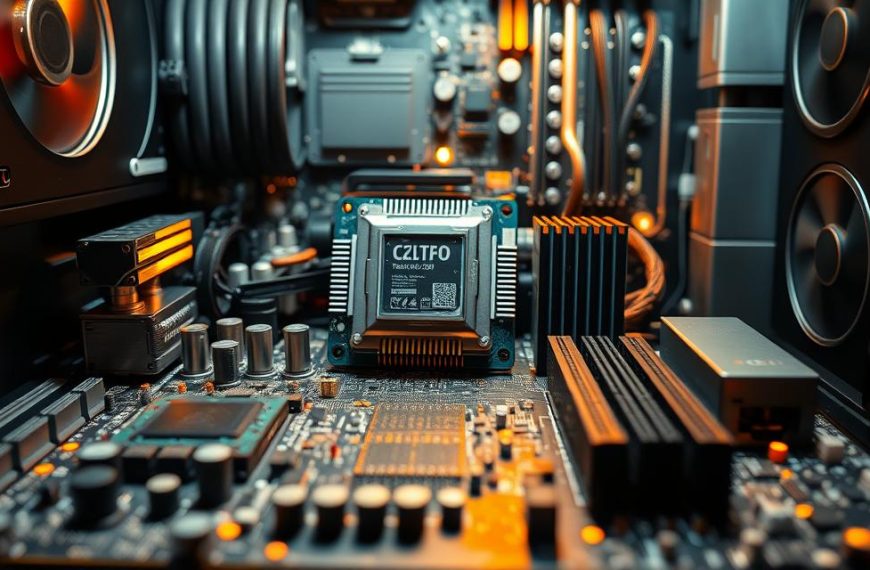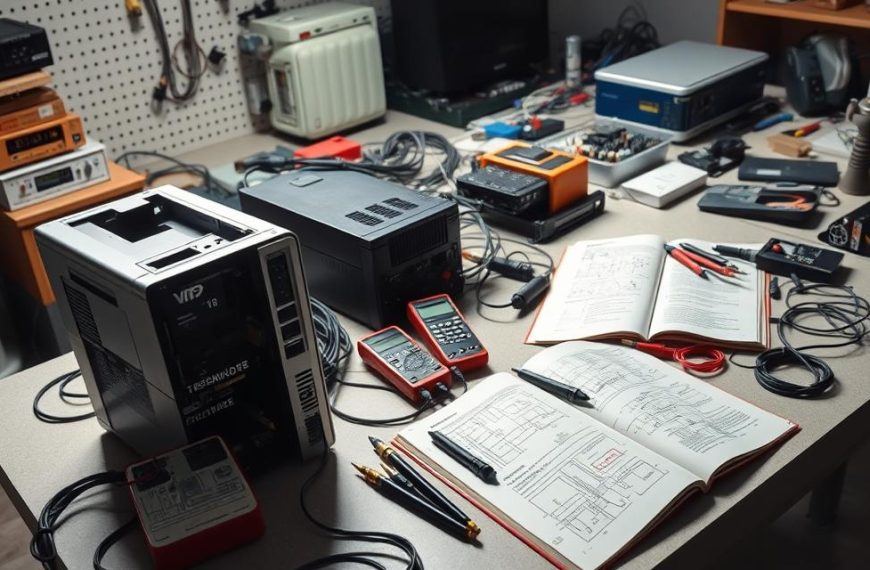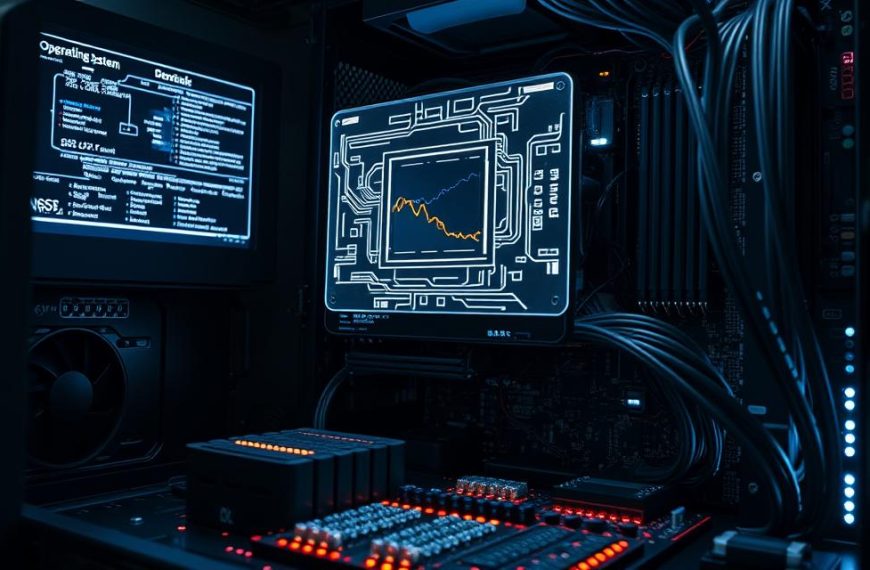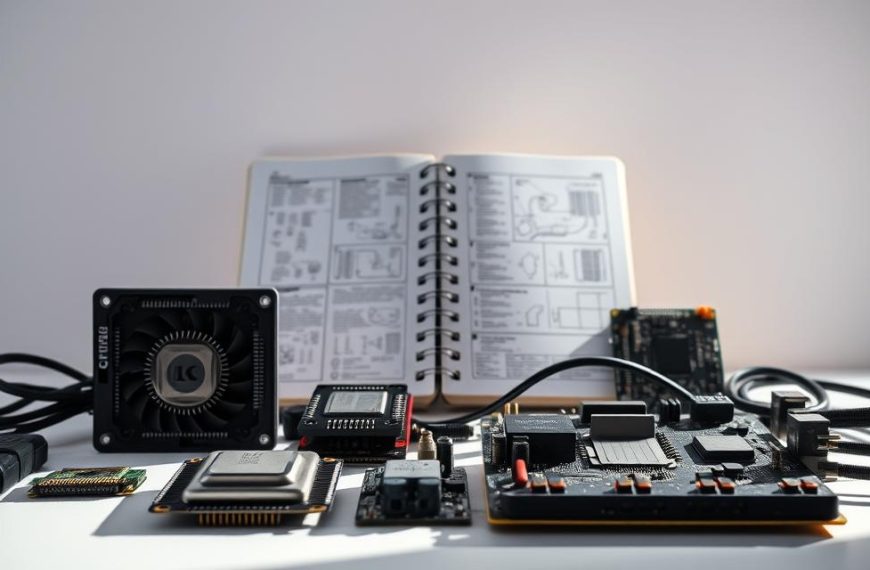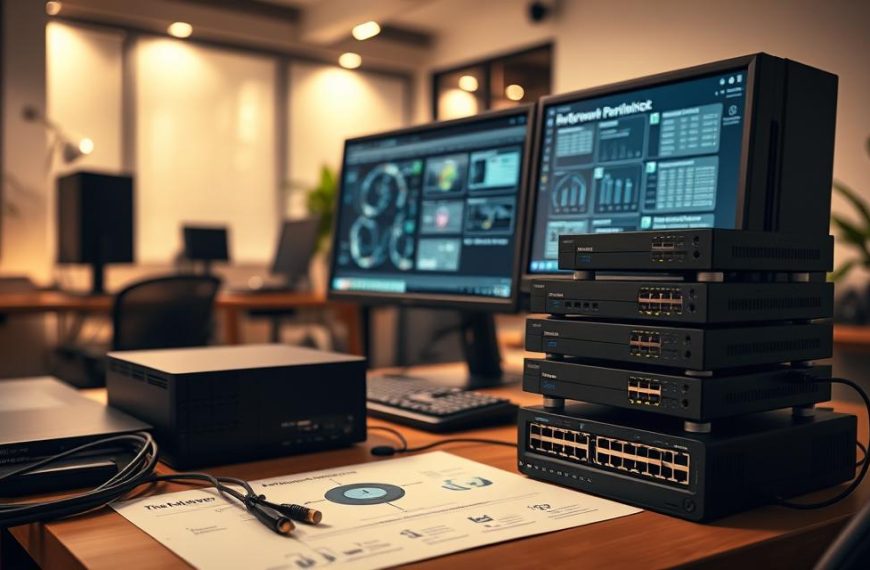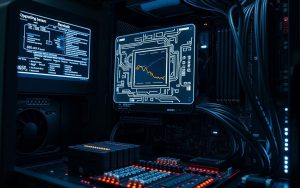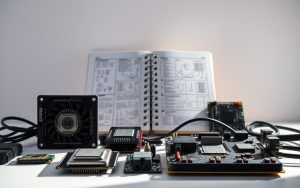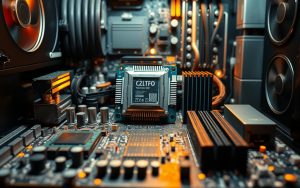Knowing your computer’s hardware specs is vital for upkeep, upgrades, and troubleshooting. PC components are the backbone of your system’s performance. Understanding these details helps you make smart choices about improving your computer.
Modern computer hardware includes crucial parts that shape your system’s functionality. These specs cover processor type, memory setup, storage space, and operating system info1. Each Windows version, from Vista to 11, has its own way to access hardware details.
Users can explore their computer hardware through various methods. Windows tools offer basic system info, while third-party apps provide deeper insights2. Quickly identifying your PC’s specs can save time during upgrades or when fixing issues3.
Checking system specs isn’t just for tech gurus. It’s useful for anyone wanting to grasp their computer’s abilities. This skill comes in handy when upgrading software, installing games, or solving performance problems.
Understanding Computer Hardware Specifications
Computer hardware specs define a system’s capabilities and performance potential. These details help users grasp how their PC will handle various tasks. They reveal the computer’s ability to manage computational challenges4.
Modern computers have several critical hardware components working together. The processor, or CPU, is crucial in determining computational power5.
What Are PC Hardware Specifications?
PC specs describe the technical attributes of computer hardware components, including:
- Processor speed and core count4
- Random Access Memory (RAM) capacity5
- Storage device type and capacity
- Graphics card capabilities
Why Hardware Information Matters
Hardware specs help make informed buying decisions. They predict a computer’s performance capabilities. Different tasks need varying levels of computational power4.
Key Components Overview
| Component | Key Characteristics | Performance Impact |
|---|---|---|
| CPU | Processor cores and speed | Determines processing capabilities5 |
| RAM | Memory capacity | Enables multitasking efficiency4 |
| Storage | HDD or SSD | Impacts data retrieval speed5 |
Choosing the right hardware ensures your computer meets your needs. This applies to work, gaming, or creative projects4.
Built-in Windows Tools to Check What Hardware is Installed on My Computer
Windows offers easy ways to discover your computer’s hardware specs. You can access this info through various methods, making hardware detection simple6.

Windows provides powerful tools for exploring your device’s hardware details. These include the Settings App, Device Manager, and Task Manager.
- Settings App: Provides a user-friendly interface for quick hardware information6
- Device Manager: Offers comprehensive hardware detection capabilities
- Task Manager: Displays critical system performance metrics6
The Task Manager is great for checking system performance. It shows CPU load, memory usage, disk activity, and network connections6.
Windows’ Device Manager helps track hardware in detail. It allows users to understand their system’s capabilities better.
For advanced users, the Event Viewer offers extensive system logs. It organises records into categories like Windows Logs and Application logs6.
Pro tip: Be careful when using system configuration tools to avoid unintended changes6.
Different Windows editions have varying levels of hardware detection tools. Some advanced features might not be available in home versions6.
Advanced Methods for Hardware Identification
Windows offers powerful tools for detailed hardware insights. The command prompt and PowerShell let users explore computer components precisely7.
- Using Command Prompt for system queries
- Leveraging PowerShell’s diagnostic capabilities
- Utilising the DirectX Diagnostic Tool (DxDiag)
Command Prompt retrieves system specs with specific commands. PowerShell offers more sophisticated information gathering techniques7.
Users can quickly extract detailed processor, memory, and hardware configuration data. The DirectX Diagnostic Tool provides in-depth analysis of audio and video hardware specs8.
Pro tip: Always ensure you’re running these tools with administrator privileges for complete hardware visibility.
These methods reveal critical system details standard interfaces might miss. They’re invaluable for troubleshooting, optimisation, and understanding your computer’s capabilities78.
Link to lspci command resources7Link to PC hardware specification details9Link to hardware identification techniques
Third-Party Tools for Hardware Detection
PC diagnostics software has become crucial for users seeking detailed system insights. Third-party tools offer advanced features beyond Windows utilities. They provide in-depth hardware specs and real-time monitoring10.
These tools help users understand their computer’s components with precision. Several top-tier software options excel in hardware detection. DevCon users can enhance diagnostics with Speccy.
Speccy offers free, detailed info on operating systems, memory, and storage devices10. HWiNFO delivers extensive real-time reports for CPUs, GPUs, and peripherals11.
MiTeC System Information X provides insights across multiple Windows versions. ASTRA32 includes sections for live hardware temperature monitoring and usage tracking10. Each tool offers unique features for specific technical needs.
When choosing PC diagnostics tools, consider compatibility, info depth, and user interface. These solutions offer unprecedented insights into hardware configuration. They ensure optimal performance and early detection of potential issues.
FAQ
What are hardware specifications?
Hardware specifications detail a computer’s physical components. They include the CPU, RAM, storage devices, and graphics card. These specs determine the system’s performance and capabilities.
Why do I need to know my computer’s hardware specifications?
Knowing your computer’s specs is vital for several reasons. It helps with upgrading components and troubleshooting performance issues. It also aids in checking software compatibility and making informed decisions about system improvements.
How can I check my computer’s hardware using built-in Windows tools?
Windows offers multiple tools to check hardware specifications. These include the System Information tool, Device Manager, and Settings app. These tools provide comprehensive details about your computer’s components.
They allow easy access to information about your system’s hardware configuration. You can quickly find what you need without technical expertise.
What are the most important hardware components I should know about?
Key hardware components include the CPU, RAM, and storage devices. The graphics card, motherboard, and power supply unit are also crucial. Each component plays a vital role in your computer’s overall performance.
Are third-party hardware detection tools safe to use?
Reputable tools like Speccy, CPU-Z, and HWiNFO are generally safe. They offer more detailed hardware information than built-in Windows tools. Always download these tools from official websites to ensure system security.
Can I identify my hardware specifications without technical expertise?
Yes, modern Windows systems offer user-friendly methods to check hardware specs. Built-in tools like System Information provide easy-to-understand hardware details. You don’t need advanced technical knowledge to use these tools.
How often should I check my computer’s hardware specifications?
Check your hardware specs when considering upgrades or experiencing performance issues. It’s also wise to check before installing new software or games. An annual review helps you stay informed about your system’s capabilities.
What additional information can advanced hardware detection tools provide?
Advanced tools offer real-time hardware monitoring and detailed temperature readings. They also provide benchmark comparisons and in-depth technical specifications. These tools go beyond basic system information for more comprehensive insights.
How do I determine if my computer can run a specific software or game?
Compare the software’s system requirements with your computer’s hardware specifications. Check the CPU, RAM, graphics card, and storage requirements. This ensures compatibility and optimal performance for the software or game.
Are there any risks in checking or modifying hardware specifications?
Checking hardware specifications is safe and poses no risks. However, physically modifying hardware can potentially damage your computer. Always consult professional guidance before making hardware modifications.
Source Links
- https://www.computerhope.com/issues/ch000017.htm
- https://m.majorgeeks.com/content/page/how_to_identify_the_hardware_in_your_computer.html
- https://www.crucial.com/articles/pc-users/how-to-check-computer-specs
- https://www.integr8mps.com/blog/what-are-specs-a-complete-guide-to-computer-system-information
- https://computercare.net/blog/understanding-computer-hardware/
- https://support.microsoft.com/en-us/windows/system-configuration-tools-in-windows-f8a49657-b038-43b8-82d3-28bea0c5666b
- https://www.avast.com/c-how-to-check-your-pc-specs
- https://askubuntu.com/questions/31618/how-can-i-find-my-hardware-details
- https://stackoverflow.com/questions/2842116/reliable-way-of-generating-unique-hardware-id
- https://www.lifewire.com/free-system-information-tools-2625772
- https://www.makeuseof.com/tag/how-to-test-your-pc-for-failing-hardware/
